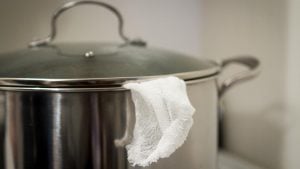Homebrewing Tips: Everything a New Brewer Needs To Know
 Beginners usually need homebrewing tips because there’s a lot of information thrown at you from the start. Homebrewing isn’t a complicated process once you get started, so don’t let the wealth of information overwhelm or scare you off.
Beginners usually need homebrewing tips because there’s a lot of information thrown at you from the start. Homebrewing isn’t a complicated process once you get started, so don’t let the wealth of information overwhelm or scare you off.
This guide will cover some helpful tips, tricks and advice that will come in handy when you start homebrewing, separating the myths from the right and reliable information.
So take a closer look at this complete guide and begin your homebrewing adventure today!
Tips for Home Brewing
Here are some helpful tips that will help in your goal of brewing beer for beginners. These will help you avoid more purchases later and get the best out of your homebrewing.
– Get a Bigger Kettle
Most people get a small, entry-level kettle when they start making beer at home.
 If you purchase a starter equipment kit, you need to get a brew kettle and the ingredients.
If you purchase a starter equipment kit, you need to get a brew kettle and the ingredients.
Starting with a 5-gallon stainless steel kettle seems like a good idea, but homebrewing is very easy and before you know it, you’ll be making much more beer than you started with.
You can start with a 7.5-gallon kettle instead.
– Get a Bigger Auto-Siphon
Another piece of equipment that you need to get a bigger size of is the auto-siphon. The auto-siphon is a fundamental tool used to transfer the kettle’s content to the fermentor. You can also take beer from the racking to the keg.
An entry-level auto-siphon is usually a 5/16-inch unit, but it’s advisable to get a larger auto-siphon from the beginning for larger beer batches. This will also save you time in transferring content.
– Always Add Oxygen to Your Wort
Oxygenating your wort is also pretty helpful in giving you a good finish, but beginners don’t know this. After boiling and chilling your wort, there is almost no oxygen left in it, but if you want the fermentation to be done correctly, you need oxygen.
If you want to add oxygen to your wort, you can use an aeration stone or an oxygenation kit. Adding water will add oxygen, dilute the wort, and reduce the flavor and ABV. Your beer will taste much better with oxygen in the wort.
– Purchase a Blow-Off Tube
When making lager beers, beginners usually end up with airlocks instead of blow-off tubes. If you’re brewing a larger batch, you can expect it to overwhelm the airlocks, and then you’ll have a big mess on your hands.
You can avoid this if you get a blow-off tube for your brewing instead. It works by putting one end of the tube in the sanitizer and the other in the bung. Remember to check on it regularly.
– Bottle the Beer on the Dishwasher
The bottling process is one step in homebrewing where you make a giant mess. Bottling usually involves sanitizing the bottles, filling them up, and cleaning the fermenter, but you can bottle your beer on the dishwasher instead and prevent the mess. If you make a mistake, your kitchen floor might end up soaked with beer.
You can bottle the beer over the open lid of the dishwasher so that any spillage will go right into the dishwasher, which is less messy to clean up. If you don’t have a dishwasher, you can reduce the spills by doing this over a large bowl.
– Invest in a Wort Chiller
Getting a wort chiller will come in handy when starting home brewing. While this might not be in your beginner’s starter package, a wort chiller will help you chill the wort as quickly as possible to prevent bacteria and other downsides as explained earlier in this guide. Without a wort chiller, cooling your wort can take up to 40 minutes to an hour by submerging the kettle in a bathtub and covering it with ice.
On the other hand, a wort chiller is usually affordable and easy to use. To use the chiller, you need to connect it to a cold water source. To sanitize it, you need to add the chiller to the boil kettle for the last 10 minutes. After removing the kettle from the heat source, just turn on the water and the chiller does the rest.
A wort chiller is also easy to clean.
– Make Your Yeast Starter
Paying attention to your yeast is very important as a homebrewer, something that beginners usually overlook. You can decide to purchase dry yeast, a tube of yeast, or a smack pack, but you should always make your yeast starter.
You can make your yeast starter in twenty minutes, which will set your fermentation cycle to a good start. It also reduces the chances of contamination in your wort since converting sugars to alcohol happens quicker when the yeasts are healthy.
– Invest in Carboy Handles
While carboy handles seem like they are useless for homebrewing, you’ll be surprised how much you’ll depend on them once you get them. Instead of waiting until you become an expert, you can add these accessories to your equipment list now.
They mainly come in handy if you have larger carboys, and they cost less than $7. They allow you to pick your carboy from the top and easily transport it across the room.
– Use a Sleeping Bag for the Mash Bag
You might not need a mash tun if you’ve just started brewing craft beer at home. After spending money on other equipment, this is a bit over-the-top and a significant investment, so you can use a sleeping bag instead.
If you have a high-quality sleeping bag, you can wrap it around the brew kettle, which contains your mash, for sixty minutes. It will hold the temperature impressively well.
If you’re planning to bring the temperature up, you can check it after 15 minutes and add more boiling water. This will save you money on purchasing a mash tun and is highly effective.
– Place Foil on the Stovetop Boil-overs
You probably have to deal with boil-overs if you’re making your beer on the stovetop. This gives you an even worse mess to clean up after making your beer. Since you can’t stop boil-overs, you can instead make it easier to clean up the stovetop in just two minutes.
This is done by adding a layer of foil to the stove after removing the burner. Your burners will poke through the foil, so if it boils over, you only have to remove the aluminum foil and dispose of it and your stovetop will be as clean as it was in the beginning.
What To Know Before You Start Brewing
Before you put your tools and ingredients together to start homebrewing, there are a few things you should first keep in mind.
-
Sanitation Is Highly Important
The first thing you should know as a homebrewer is the importance of sanitizing and sterilizing everything involved in homebrewing. Sanitation is highly essential from the moment you start boiling water to when you bottle or keg the beer.
Sterilization is the most important step during the period before you cool your beer. This is because bacteria and other infections will affect the beer before the yeast ferments.
-
Dark Beers Are a Good Starting Point
As a beginner, it’s good to start by brewing darker beers. Even if you prefer drinking light beers, darker beers are more forgiving in the brewing process.
You can easily cover them up if you make mistakes because of the flavor profile. Since you will probably make some mistakes when you first start brewing beer, you can make things easier for yourself with dark beer.
-
Purchase Glass Fermenters
When shopping for your home brewing kit equipment, you should go for a glass fermenter and not a plastic one. Beginners mostly opt for plastic fermenters because they are cheap, but glass offers different benefits.
They are easier to clean and sterilize, and the contents won’t stick to the inside. It provides a sound barrier against oxygen, unlike plastic.
-
Always Cool Your Wort Fast
Before starting on your homebrewing journey, keep in mind that you need to cool the wort fast. Cooling the wort quickly increases the fallout of proteins and tannins that can affect your beer. It reduces the chances of growing bacteria in the wort and improves clarity.
-
Get the Freshest Ingredients
Like cooking, getting the best ingredients for your brewing is very important. Ensure that you purchase only fresh ingredients from reliable sources, and, with this, you need to understand the ingredients used in making beer. It would be best to store fresh hops in your freezer, but crushed grains and malt can’t be stored or the flavor will be affected.
-
Invest in Homebrewing
If you’ve decided to get into homebrewing, treat it like an investment rather than a hobby. Any time you want to purchase equipment, you should focus on how it can work for you in the long term. If you buy low-quality equipment because of its low prices, you will end up spending more money in the future.
Benefits of Brewing Your Beer
If you’re still on the fence about getting started brewing beer, you’ll be surprised to see the different benefits it comes with. Aside from being an enjoyable hobby for beer enthusiasts, you can make fantastic beer once you get the hang of it. You can quickly develop new recipes and tweak beers to match your palate.
-
Save Money on Beer
While the main benefit of homebrewing isn’t to save money, there’s no denying that this is a perk. You can brew beer at home at half the price used to purchase commercial beer. In addition, you end up with a lot of beer to enjoy at home.
-
Easy To Get Started
It is easy to get started once you’ve decided to brew a beer at home. You only need little equipment, and it only takes a few hours a day. Once you familiarize yourself with the process, you can cut down the time required. You don’t even have to be at the stove for the whole mash or boil, so you can do other things while making your beer.
-
More Beer Freedom
Brewing your beer at home gives you a lot of freedom over the types of beer you want to make and the flavors you’re looking for. If you have a weird idea for a beer, you can try it out as long as you know how to homebrew.
Conclusion: Dive Into Homebrewing Today!
 Anyone can start homebrewing with the right equipment, ingredients and information.
Anyone can start homebrewing with the right equipment, ingredients and information.
Here are the main points to remember:
- Before brewing, remember to sanitize, purchase a glass fermenter and get fresh ingredients.
- Treat homebrewing as an investment by buying high-quality equipment.
- Start with a bigger kettle and auto-siphon.
- Some equipment you should buy that is not considered entry-level are a blow-off tube, a wort chiller and carboy handles.
- Reduce cleaning messes by adding foil to the stovetop and bottling your beer over the dishwasher.
- Always add a yeast starter to your wort and oxygenate it.
- Homebrewing is easy to start and gives impressive beer freedom for enthusiasts.
With these helpful tips, we hope you can seamlessly ease into the world of homebrewing to make delicious beers. You can even get started today!






